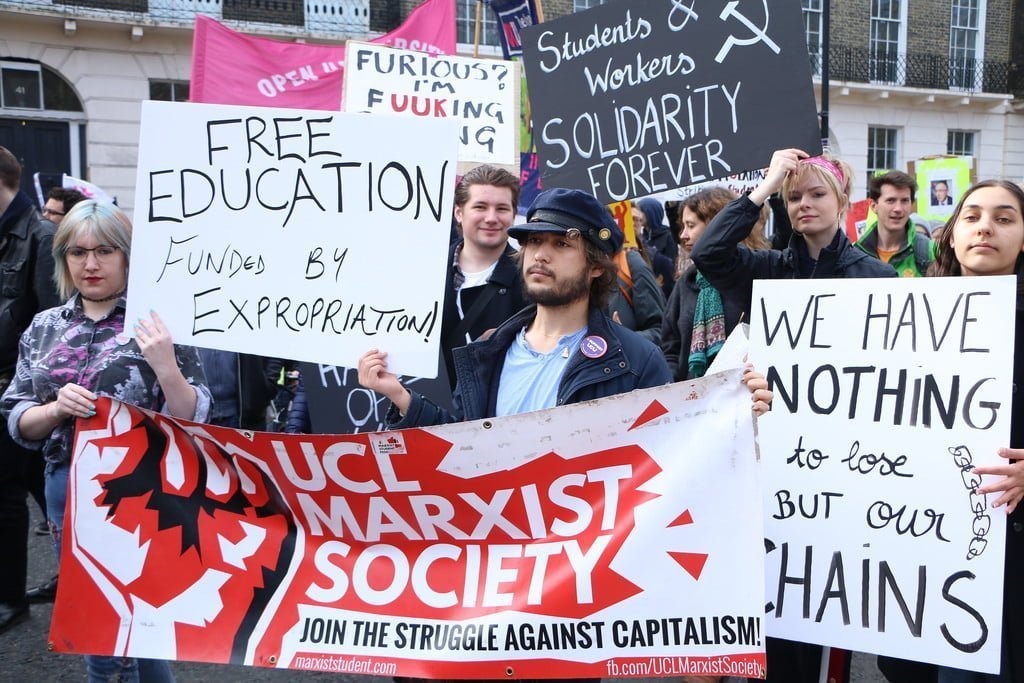Now that the UCU dispute is over, we must learn the lessons from this important struggle by workers and students.
The strike action taken by the University and College Union (UCU) in February and March 2018 was the most militant in the union’s history. The strike could have been used as the basis for a public sector wide general strike, which in turn could have been used by the leaders of the Labour Party to bring down the government and put Corbyn and McDonnell into Downing Street.
A Corbyn government, to carry out its programme, would have to nationalise the banks and biggest businesses and use society’s wealth for need instead of profit. Ultimately, this the only strategy capable of safeguarding university staff pensions, and the entire public sector, for the future.
This was the argument put forward consistently by the Marxists involved in the dispute, at rallies and in our leaflets and other published material distributed at the demonstrations and on the picket lines.
Marxists were involved in the dispute (to a greater or lesser extent) on campuses in Sussex, Cambridge, Kent, Warwick, Edinburgh, Glasgow, Leeds, Leicester, Liverpool, SOAS, Queen Mary, UCL, KCL, Manchester, Newcastle, UEA, Oxford, Sheffield, and Southampton. Everywhere we have been involved, we built support for the strike by arguing the case for a fundamental socialist transformation of society.
However, dominant throughout the dispute were the ideas and methods of the UCU leaders, the student union leaders, and the self-proclaimed student ‘activists’. No-one can doubt the militancy and determination of those staff and students who participated in this struggle. In fact, almost all of the most active members of UCU were willing to continue the struggle much further than it eventually went. But all this potential to continue the fight and transform society was squandered by the movement’s so-called leaders.
The end result of the reformist ideas and methods used in this dispute by its leadership has been the stitch-up, with a bad deal, of the staff who took strike action. We must learn the lessons from this experience to ensure that, next time, our action is successful.
The need for a socialist programme
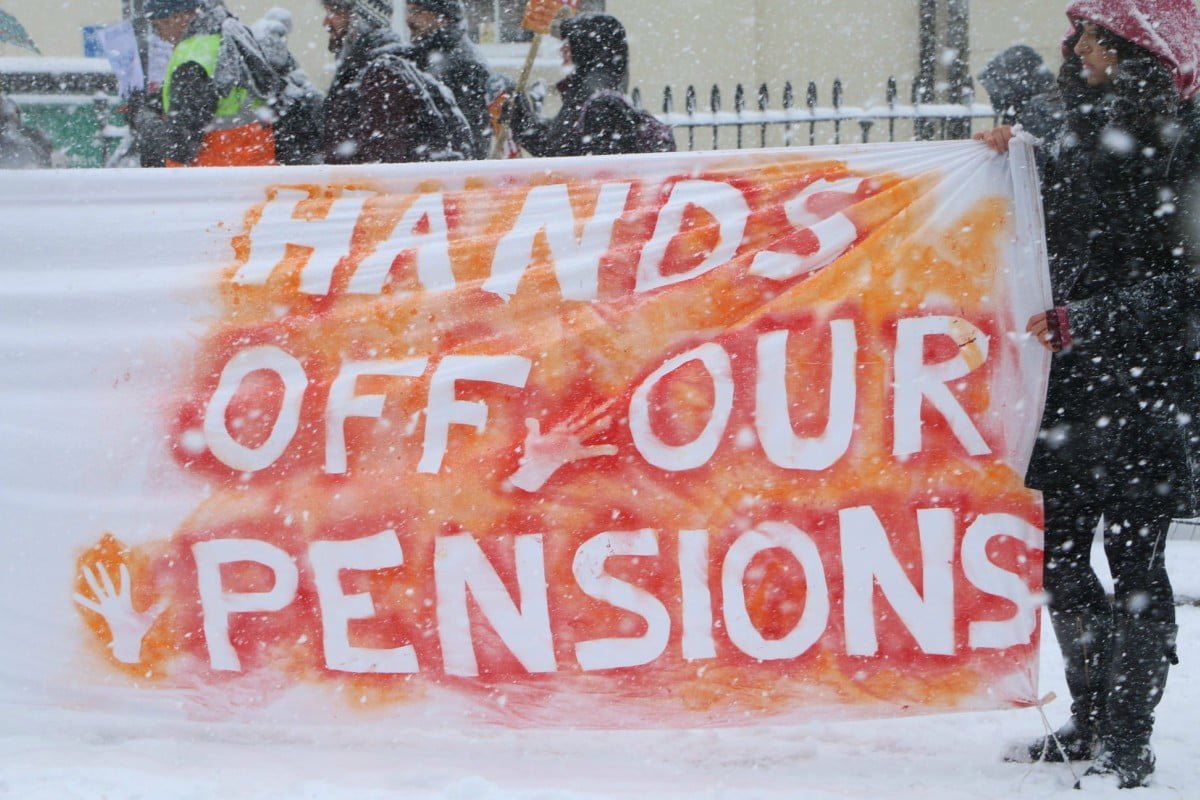 The main aim in any industrial dispute, this one included, is the winning of immediate concessions to solve the problem that has sparked the dispute in the first place. But it’s equally important to understand why the problem arose in the first place, so as to tackle the cause as well as the symptom.
The main aim in any industrial dispute, this one included, is the winning of immediate concessions to solve the problem that has sparked the dispute in the first place. But it’s equally important to understand why the problem arose in the first place, so as to tackle the cause as well as the symptom.
In this case, the attacks on pensions are the product of the marketisation of education, which in turn is caused by a capitalist system in crisis desperately seeking new avenues through which to make a profit. Unless we tackle capitalism itself, we will be reduced to endlessly fighting the various symptoms of this system, such as pension cuts.
Throughout this dispute the question of the marketisation of education was repeatedly raised on the picket lines and in the occupations. But the cause of this process of marketisation – the capitalist system itself – was not raised by anyone except the Marxists.
This failure of the UCU leaders and the student ‘activists’ to explain that capitalism makes the provision of good pensions impossible is a mistake. It means that the movement was not steeled for the kind of struggle necessary to guarantee the security of pensions in the long-term, thereby paving the way for defeat, demoralisation and confusion.
This is why a socialist programme is central to building a successful industrial struggle. It provides a logical, coherent and realistic programme for securing the aims of the dispute far into the future, by tackling the cause of the problem, not just the symptom.
The RMT union, one of the most militant and successful unions, includes in its Rule Book the following: “The objects of the Union shall be…to work for the suppression of the capitalist system by a socialistic order of society”. Had these words been put into practice by the UCU leaders and the student ‘activists’, this struggle could have been enormously strengthened.
In Cambridge, the Marxist society organised a discussion at the occupation on the topic of Marxist economics, to link the points about marketisation and the logic of the capitalist system as a whole. A Marxist member of Unite made a revolutionary anti-capitalist speech at the Cambridge strike rally and got a fantastic response.
One member of the KCL UCU and the Marxist society explained to Adam Boulton of Sky News that the money exists in society to fund decent pensions and free education, but that it’s in the wrong hands. He said we need to go further than simply taxing the rich and start expropriating some of this wealth. As Boulton himself pointed out, this would amount to major social upheaval – i.e. the overthrow of the capitalist system.
Marxists in Sheffield, Warwick, Glasgow, Cambridge, KCL and elsewhere gave speeches at strike rallies, teach-outs, and demonstrations explaining the need to link this dispute with broader political questions and the need for a socialist programme. Marxist students also submitted a motion to the NUS conference in March that made the same points.
This was in stark contrast to the UCU leaders whose approach to the strikes has been to see them as a tool for greater leverage in negotiations with university bosses, as opposed to the starting point for a movement to bring down the government and transform society. Even the ‘left’ leaders of the UCU could only muster a demand to “fight for the status quo” – hardly the most inspiring slogan when the status quo is barely tolerable for most people.
For activism – but what kind?
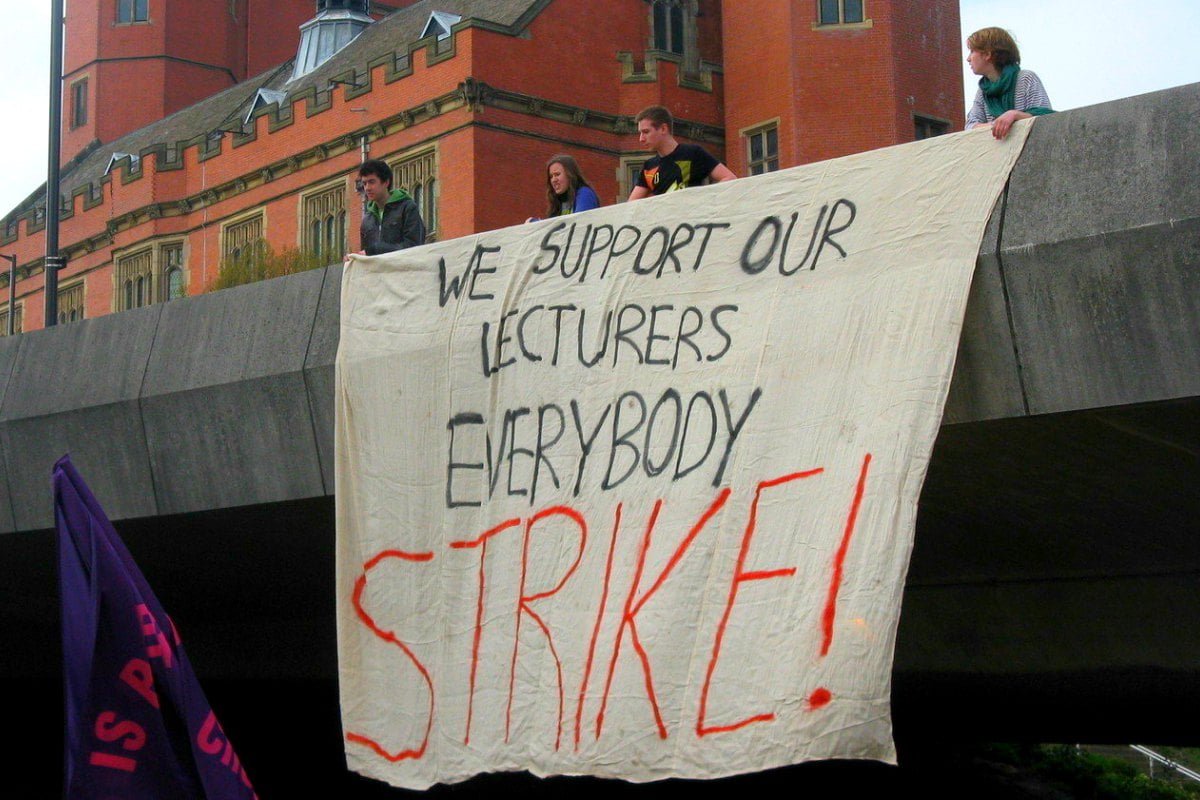 Equally bad, or in some cases even worse, was the approach of the student union leaders and the student ‘activists’. In Kent, the student union leaders took two weeks to show their faces on the picket lines. When the president tried to address the crowd her speech was so lacking in serious ideas, programme or support for the strikes that she was booed and heckled by students.
Equally bad, or in some cases even worse, was the approach of the student union leaders and the student ‘activists’. In Kent, the student union leaders took two weeks to show their faces on the picket lines. When the president tried to address the crowd her speech was so lacking in serious ideas, programme or support for the strikes that she was booed and heckled by students.
Likewise, the NUS conference in March should have been used to discuss the programme and approach of the NUS to the strikes. But incredibly, the most important strikes in Higher Education’s recent history were not discussed at all, thanks primarily to the bureaucratic manoeuvring of the NUS leaders.
Unfortunately the NUS leaders were unintentionally aided in their manoeuvring by the ultra-left approach of some frustrated student ‘activists’ who shut down the conference for three hours after a motion to decriminalise sex work was pushed off the agenda.
Even the so-called ‘left’ at the NUS conference, who ran a number of candidates for election to the NUS executive, failed to put forward a socialist programme for the student movement. Just one single candidate said the word ‘socialism’; and even then, it was used as an empty slogan rather than a programmatic point.
Another ‘left’ candidate used her election speech to describe her experience in a university occupation, summing it up with the words “I’ve done a shit in a bag for this movement and, if you elect me, I’ll do it again”. Needless to say, this isn’t the socialist programme the NUS needs.
In a similar vein, a group of students in Edinburgh used the strike as an opportunity to occupy a lecture theatre. They issued a leaflet encouraging students to join the picket lines and to send an email to university management.
Also on their leaflet was a request for students to join the occupation.To promote this the ‘activists’ considered issuing a set of demands to supplement those of the staff on strike, to explain the specific purpose of the occupation. But an initial decision was taken against issuing demands because the university might meet them, which would mean having to end the occupation. Better, they felt, to have no programme whatsoever (the ‘About’ section on their Facebook page simply read “Democracy, accessibility, education”) because it might get in the way of their activism.
Eventually, under pressure to firm up their position, the occupiers put a declaration on their blog, which makes no demands but lists things that they are “resisting”. And this is supplemented by a wishlist of things they’d like to change about Edinburgh university, some of which, like a demand for no deductions to the pay of striking staff, are good suggestions. But most of this wishlist isn’t linked either to the strike, or to a programme through which to achieve that change.
The need for leadership
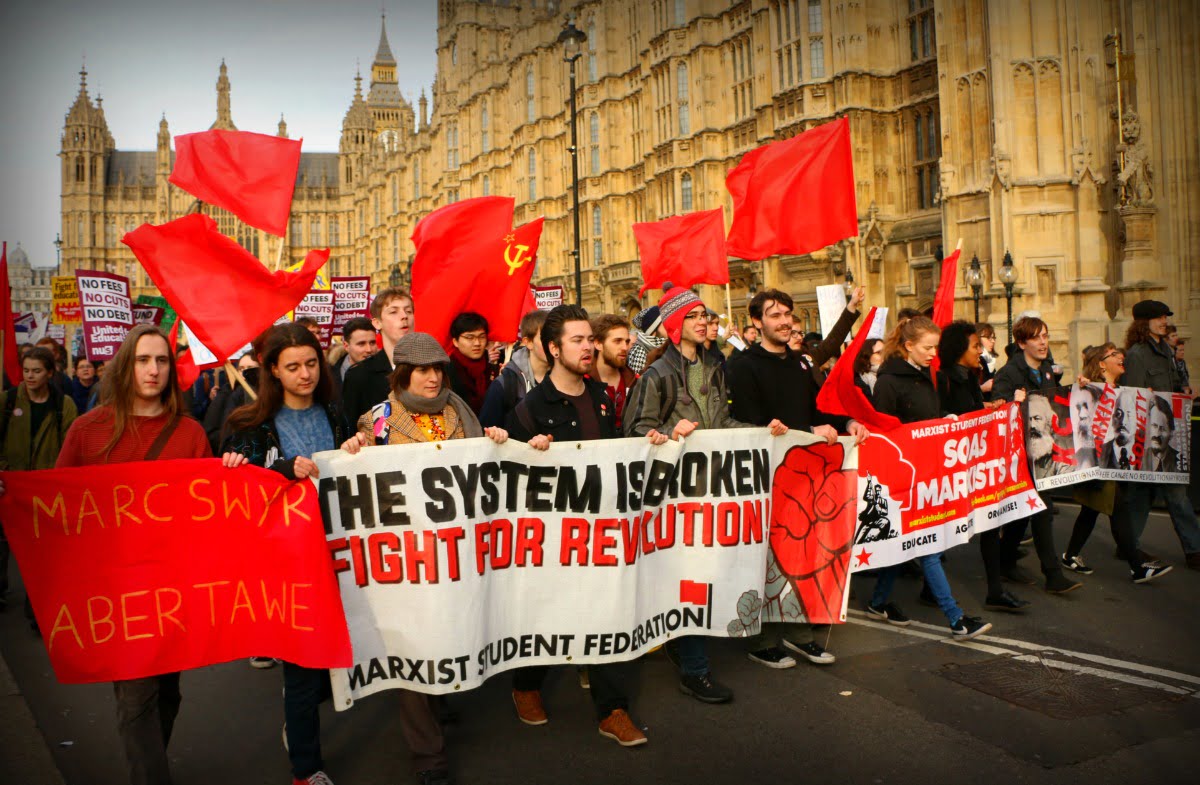 Too often, from student union leaders and other ‘activists’ around the country there were attempts to justify the lack of a real programme on the basis that we mustn’t ‘appropriate’ the strike by raising demands that link the dispute to broader political questions. In this justification there was no difference between the student union leaders and ‘activists’ and the UCU leaders who sought to constrain the movement within the narrowest possible limits. It’s a strange approach to insist that we limit ourselves to fighting the symptom of a disease, without making any effort to identify its cause.
Too often, from student union leaders and other ‘activists’ around the country there were attempts to justify the lack of a real programme on the basis that we mustn’t ‘appropriate’ the strike by raising demands that link the dispute to broader political questions. In this justification there was no difference between the student union leaders and ‘activists’ and the UCU leaders who sought to constrain the movement within the narrowest possible limits. It’s a strange approach to insist that we limit ourselves to fighting the symptom of a disease, without making any effort to identify its cause.
What’s been missed by too many student unionists and ‘activists’ is that it is the duty of the organised left to take the lead in initiating discussions and raising demands that link the symptom to the cause. Without such leadership and demands, the movement cannot move forward and solve the fundamental problems that sparked it. To reject developing such a programme is, in fact, to hold the movement back.
There are many examples of the programme (or absence thereof) of the student ‘activists’. In some places there were statements issued by some student groups which did, at least, try to link the UCU dispute with the broader political questions involved. But, again, the programme put forward by all of them without exception fell far short of what’s necessary.
A statement signed by student ‘activist’ groups in Reading, Dundee, Queen Mary, and Exeter said that the problem of marketisation can be solved by taxing the rich and big business. This is a mild reform to the capitalist system, and one that categorically will not solve the problem. The rich know how to avoid tax; does anyone seriously think they will submit to higher taxes rather that move their wealth abroad? This is not a serious policy for fighting the marketisation of education.
We can’t just ask nicely for the capitalists to stop marketising our education – we have to expropriate their wealth and businesses without compensation in order to stop them. If you accept the capitalist system, no matter how much you try to blunt its sharpest edges, then you must accept its logic – which is marketisation. The only way to stop marketisation is to break the logic of capitalism by overthrowing the system itself.
Other statements and programmatic demands issued by various student ‘activist’ groups were similarly underwhelming. At one ‘summit’ of these student ‘activists’, they couldn’t even bring themselves to put “tax the rich” into their demands. Instead the demands were limited to the maintenance of the status quo (plus a “gender impact assessment” of the proposed pension reforms). The question of taxing the rich appears in their statement only as a declaration of belief rather than as a concrete demand.
The militancy and energy of the movement around this strike action was extraordinary. With the correct programme and leadership there’s no doubt it could have been the starting point for a fundamental transformation of society that could have defended education, healthcare and other public services far into the future.
The UCU leaders and the student ‘activists’ are guilty of a criminal waste of the potential of this movement by limiting its programme to meek reforms, minor concessions, and maintaining the status quo.
The need for revolutionary methods
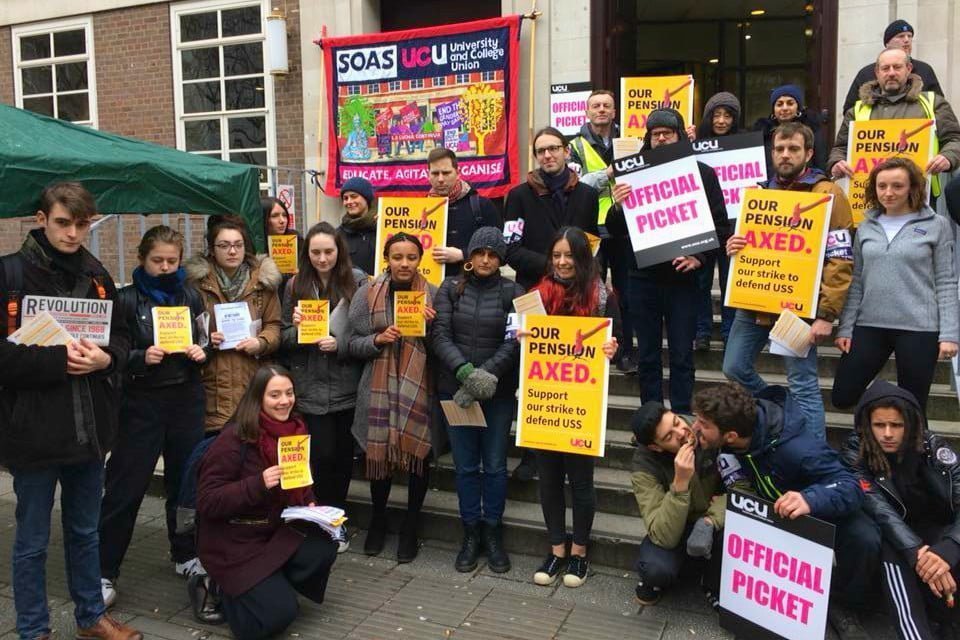 It is elementary to any industrial dispute that solidarity is the key to victory. This means, above all, solidarity between workers of different sectors and industries and, in the case of this UCU dispute, solidarity between workers and students.
It is elementary to any industrial dispute that solidarity is the key to victory. This means, above all, solidarity between workers of different sectors and industries and, in the case of this UCU dispute, solidarity between workers and students.
As discussed above, a clear socialist programme is essential for giving people confidence that a dispute can be won. But correct tactics are also necessary for building solidarity.
What’s required are tactics that turn the dispute outwards to involve as many people as possible and push the movement towards escalation.
Unfortunately, this isn’t what we’ve seen from union leaders, the Labour party leaders, or the student ‘activists’.
Unison, many of whose members are part of the same pension scheme that was the subject of the UCU dispute, agreed to consult its members on the proposed changes to the scheme early in February, but didn’t do so until its leadership came under pressure from its members as the strength of support for the UCU strikes became clear.
In the University of East Anglia and in Cambridge, among other places, Marxists who are university workers but who are not part of the UCU were raising the need for cross-union solidarity action.
At a UCU demonstration in London, after which John McDonnell expressed his support for the strike action, Marxists marched alongside striking staff. There we made the argument for a combined struggle on the political and industrial fronts to bring down the government and win the dispute. We pointed out that this must mean more than words of solidarity – we needed concrete action from the Labour leaders. But this was not forthcoming.
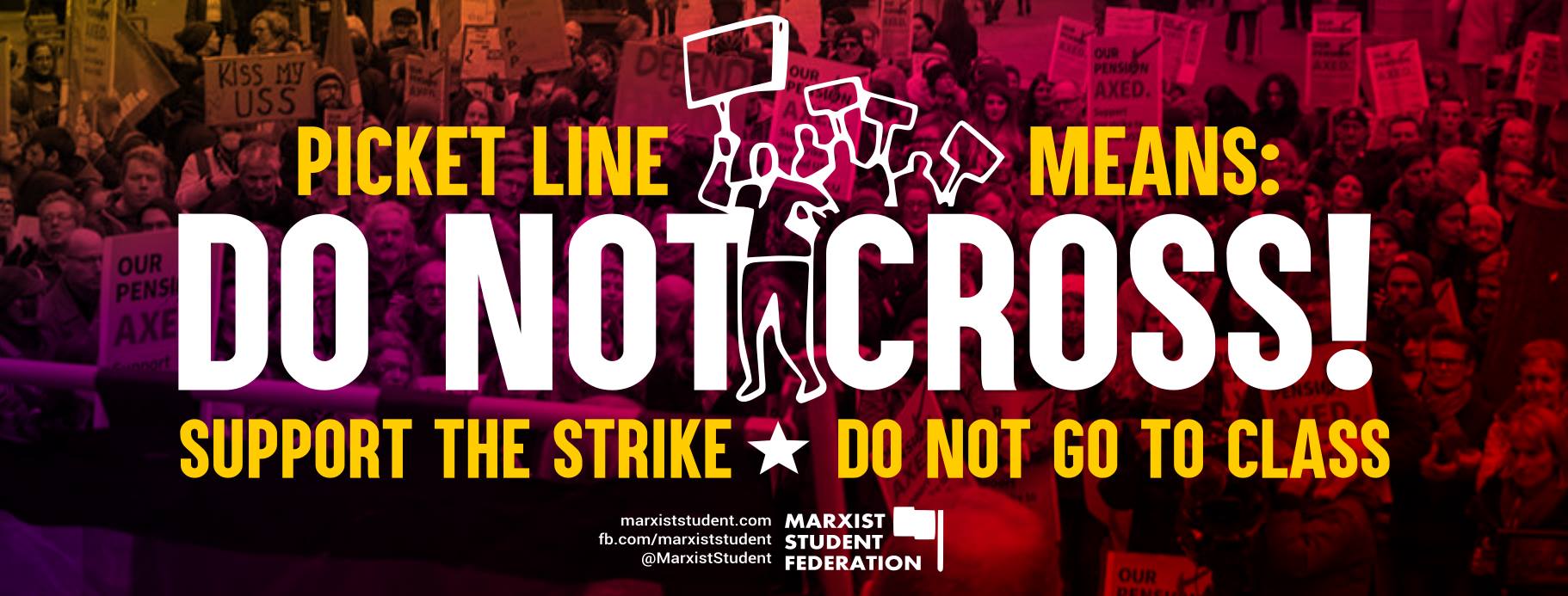
On the picket lines UCU members worked hard to mobilise student support for the strike. The Marxists participated energetically in this work. We attended picket lines on 20 campuses, handed out UCU leaflets, and advised students as to why they shouldn’t cross the lines. In Glasgow a dearth of official leaflets meant that the Marxists’ leaflet was adopted as a de facto leaflet of the strike, and we used our printing facilities to keep those on the pickets fully stocked with leaflets.
In UCL, the Marxists produced a useful Q&A as guidance for how to convince students not to cross the picket lines. And in Liverpool, Cambridge, UCL, Manchester, KCL, Warwick and elsewhere, Marxists interviewed striking workers and publicised their explanations of the strike action online and across social media.
In UEA and Edinburgh the Marxists organised panel discussion events for striking staff to convince students to support the strike. Similarly, a number of Marxist societies invited UCU members to address their meetings in advance of the strike to encourage students to join them on the picket lines.
At Queen Mary, the Marxists, among many others, argued successfully in favour of the student union coming out in support of the strikes. And at SOAS, the Marxists joined those who vigorously and successfully defended the student union leaders who were threatened with a vote of no confidence for committing the student union to support of the strike action.
All this work, from the picket lines, to the demands on the Labour leaders, to the pressure on the leaders of other unions, is how solidarity is built – by bringing more and more people into the struggle, by winning the argument for the strike, and trying to escalate the action.
Occupations
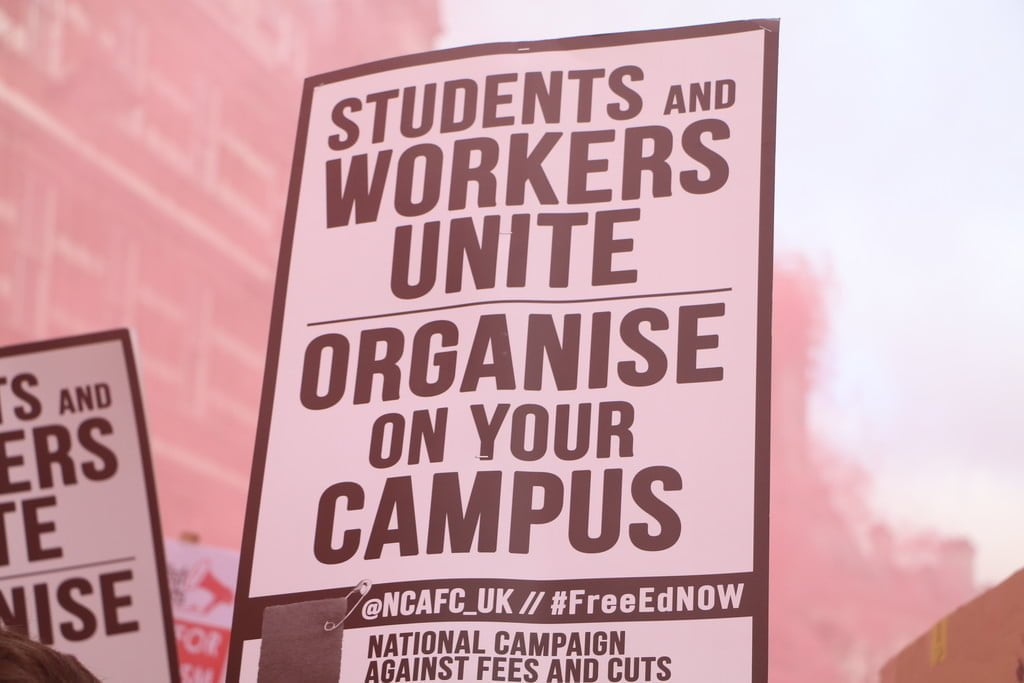 Unfortunately, the same approach cannot be said to have been consistently adopted by the student ‘activists’.
Unfortunately, the same approach cannot be said to have been consistently adopted by the student ‘activists’.
One tactic, which some students tried to use, and which could have been enormously powerful, is that of student occupations. Occupations can be used to great effect in supporting workers in struggle. To be successful such occupations must be turned outwards and used to engage as many people as possible in the struggle at hand.
Many of the occupations of the student movement of 2010 provide useful lessons in how to do this well. In the 2010 Cambridge occupation, for example, the students built a coalition of support for the occupation, from the student union to the local trade union branches to school students. An enormous rally involving hundreds of people was held inside the occupation and hundreds of students participated in the occupation at one time or another.
In recent weeks university occupations in France, which have involved thousands of students, were built for and used in a similar way. The key has been to turn them outwards as one tactic in a broader struggle.
Unfortunately, most occupations that accompanied the UCU strikes have not been used in this way.
Almost without exception, the occupations were launched by small cliques of student ‘activists’. This seems to be following advice on one ‘activist’ website which suggests that the first step to staging an occupation is to:
“Work in concentric circles, rippling outward, including more people each time. Get a few people together who are up for it. That small group should get together everyone they know who might be up for it. And then that larger group should call everyone they know… and so on.”
This is categorically not the first step in building for a successful occupation. As the Marxists said during this dispute:
“The best basis for an occupation would be a mass meeting of students and staff to discuss the strike action, the issue of pensions, the broader attacks on education, and how we can support the struggle to defend education. Every effort must be made to involve the local UCU and the local student union in such a meeting. Off the back of such a meeting, as long as it is built for and the everyone is convinced of the need to take the struggle forward, an occupation could be successful in connecting with many people. In other words, we should think of a mass meeting as the launch-pad for an occupation.”
Instead of basing our political activity on friendship groups and “getting together everyone you know”, we should base ourselves on a political programme and connecting ourselves to the mass movement we are trying to support.
In Cambridge, the Marxists submitted a motion to the student union to try to broaden support for an occupation at that university in advance of it taking place, so that it could have a mass basis instead of being run by a small clique. And Marxists involved in the planning stages of occupations in Sheffield, KCL and elsewhere also argued for this approach.
But, in general, the Marxists were in a minority. The result was some occupations that, for lack of mass support, lasted for no more than a few hours, such as in Southampton and Liverpool.
Where the occupations lasted longer, Marxists participated energetically in them and argued to turn them outwards. In Queen Mary, the Marxists successfully argued for the occupation to organise a mass demonstration on the campus in support of the strikes and to involve more students in the occupation.
A similar argument was put forward in Cambridge, for an occupation-organised solidarity demonstration to coincide with the last day of the strikes. Strangely, in Cambridge, the Marxists were forced to argue for this against some ‘activists’ who seemed more interested in the non-strike-related activity of a demonstration against fossil fuels on the day before the last day of strike action.
The need to turn outwards
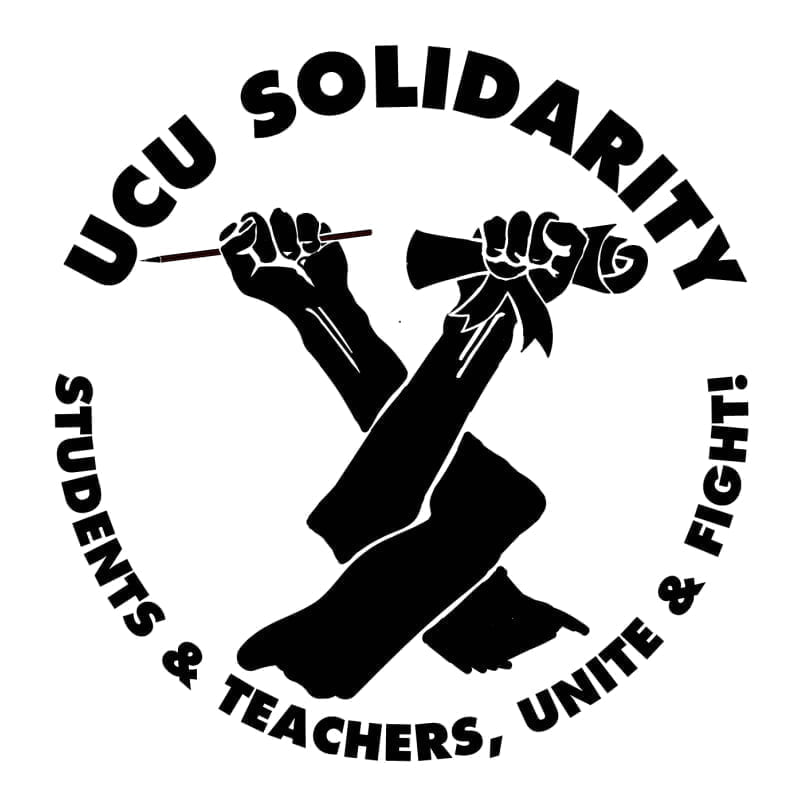 Everywhere Marxists participated in the occupations we argued for the students to issue demands to supplement and develop the UCU strike action. On the basis of those demands, mass meetings, held in the occupations, could have been built for to engage more students in the struggle. But, in many cases, the Marxists were scuppered in these efforts by the student ‘activists’.
Everywhere Marxists participated in the occupations we argued for the students to issue demands to supplement and develop the UCU strike action. On the basis of those demands, mass meetings, held in the occupations, could have been built for to engage more students in the struggle. But, in many cases, the Marxists were scuppered in these efforts by the student ‘activists’.
On the initiative of the ‘activists’ and against the advice of the Marxists, many of the occupations, such as Liverpool, Reading and others were held in corridors or small administrative offices in inaccessible parts of university buildings. These seem to have been chosen without any thought given to how the mass of students could engage with such an occupation.
Once established, the occupations were characterised by discussion meetings on topics such as Drag Culture (Reading), Lesbianism in 20th Century Britain (Edinburgh), Divestment (Cambridge), and other issues that were unlikely to mobilise the mass of students to support the UCU strikes. This was despite the suggestions of the Marxists that the occupations be used as forums for discussing the strike, and for preparing practical help for the staff on strike, like making food and drink for those on the picket lines and organising delegations to the picket lines.
The result was that almost all of these occupations failed to engage many people in the struggle, beyond the usual band of student ‘activists’. For example, the Reading occupation, which started with 13 people, gradually dwindled until there were six people remaining, at which point the occupiers decided to throw in the towel.
In fact, not only did many of these occupations fail to engage new people in the struggle, in some cases they actively harmed the cause of solidarity. In some places, suggestions that the occupiers might expand their efforts to occupy buildings such as university libraries alienated many students. And in Sussex the occupiers shut down a university building site, resulting in the zero-hours contract construction workers being sent home without pay.
There can be no question of the good intentions of many of the ‘activists’ involved with the dispute. But the road to hell is paved with good intentions.
Many of the occupations that coincided with this dispute amounted to little more than activism for its own sake. They were not properly thought out as part of a broader strategy to escalate and build support for the UCU strike. As a result, they squandered the potential that this movement offered to engage many more students in the struggle.
The need for Marxism
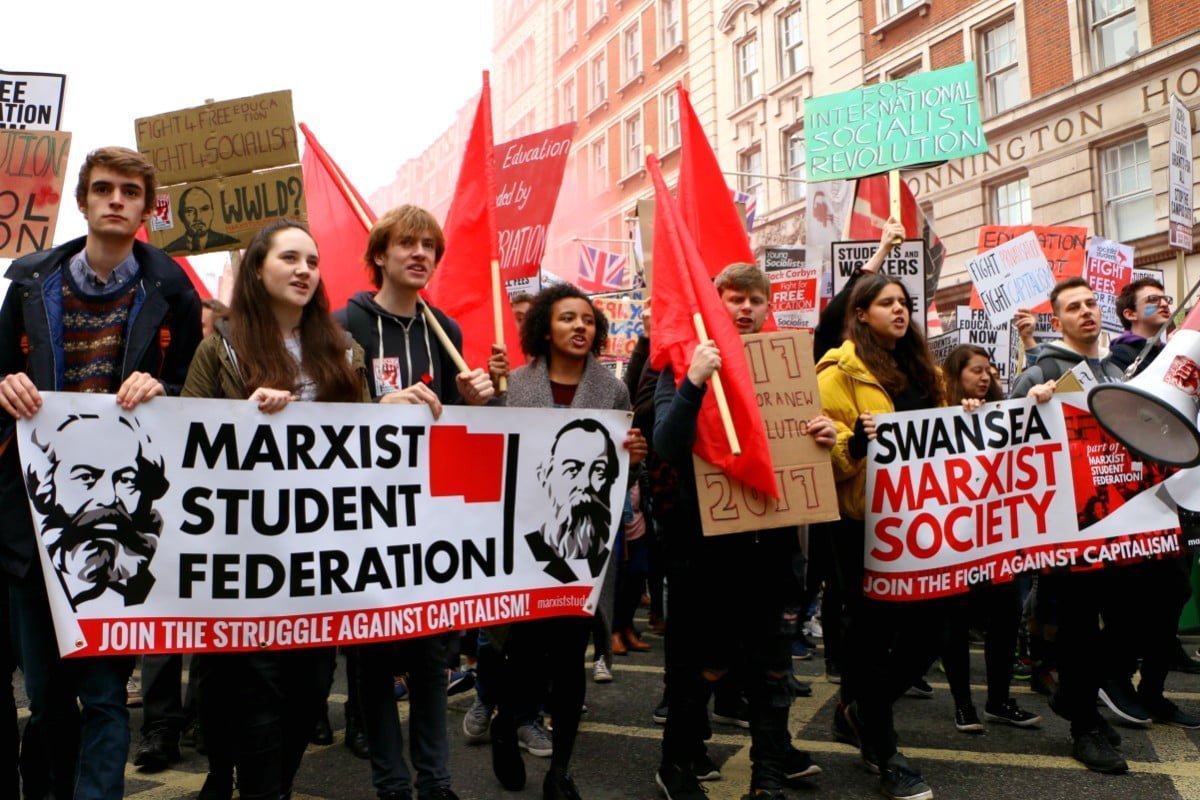 The Marxists were consistent throughout this dispute in our arguments for a socialist programme and revolutionary methods that can engage broader layers of workers and students in the struggle.
The Marxists were consistent throughout this dispute in our arguments for a socialist programme and revolutionary methods that can engage broader layers of workers and students in the struggle.
We were in a minority in the movement, but we stuck to our guns. This is because, for the last few years, Marxists on campuses and in towns and cities up and down the country have been meeting regularly to study and discuss the history and theory of the class struggle and its relevance to today.
It is common to hear bureaucrats and student ‘activists’ dismiss regular discussion meetings and reading groups on Marxist texts as unimportant or unnecessary. But this dispute has highlighted the mistakes that can be made when a serious approach to theory is ignored.
While most of these ‘activists’ tend to ignore theory most of the time, when it comes to picket-line ‘teach-outs’ and occupations they suddenly become desperate to pour their energy into ‘theoretical’ discussions which are, at best, only tangentially related to the dispute at hand. In this way theory is treated as a diversion or merely an intellectual curiosity, as opposed to a guide to action.
Marxists understand that it is the study of the science and logic of the class struggle, and through learning the lessons of the past, that we can avoid making mistakes in the future. For us, theory is not an ornamental optional extra that can be improvised in the midst of a dispute. We need to study Marxist ideas and learn the lessons from history in advance of struggles breaking out so that we can use our theory as an essential tool to guide our action.
For the Marxists, this dispute has reinforced our conviction that a revolutionary socialist approach is needed in the trade unions, the student unions, and in the broader labour and student movement. If the leadership of the movement is abandoned to the likes of the so-called leaders who have dominated this dispute, we will never fundamentally solve the problems faced by workers and students.
This dispute has also highlighted that the forces of Marxism are still far too small for the task we set ourselves – that of ensuring the overthrow of capitalism and the running of society and the economy by the working class in its own interests. This is why we will now take up our work of training and educating a new generation of class fighters all over the country with renewed vigour.
This UCU dispute is symptomatic of an approaching stormy period of class conflict. The Marxists are preparing seriously for this and we welcome all workers and students who want to join us in the struggle for the socialist transformation of society.

